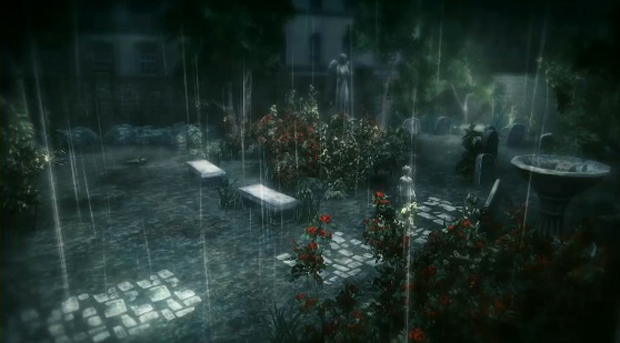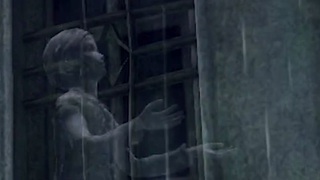Acquire’s moody tale is a metaphor for many things, including my feelings about the title. The storms channel the sadness of this world that’s been built, and though subtle, the words and phrases are selectively McCarthyian in their weight and effect; each word is heavy and wet with a meaning far deeper than they may suggest. Unfortunately, the game lacks a real sense of engagement. Its presentation implies that the game is a deeply layered package just waiting to be unwrapped, but when you put hands to it, you realize there isn’t much under the stylish exterior. 
A small, European-inspired town is cloaked in darkness after the hero, a young boy, falls asleep. When he awakens he’s met by a world that lies parallel to his – one that is invisible. While in it, he too is invisible, until he lets the somber and unnaturally incessant rain wash over him. The water takes his form when he is exposed to it, and this is the driving gimmick of rain. All other inhabitants of this plane – a young, equally lonely girl, hound-like beasts, a hulking giant known as the “Unknown” – all play by this rule, as well. Thusly, the chief puzzle/platforming mechanic centers around what can and can’t be seen. Find shelter under an overhang, and vanish from enemy eyes. An interesting ploy, but the gimmick wears itself out quickly, thanks to the very limited ways one can feasibly use this sort of trope in a game with very little real action.
This may also partly be to the lackluster enemy A.I. With the exception of the “Unknown,” all other creatures take very little effort to elude, which is a misstep in the stealth design brought to the title by the Tenchu developer. Even if I am discovered and an all out foot chase has ensued, all I need do is slip out of the rain, and I am invisible to my pursuer, who gives up its chase immediately. It’s not too hard to make the leap of logic that I probably still exist, as these things are as equally exposed to this phenomenon as I am. In the effort to make this game accessible to people who would appreciate it more for its art, though, it removes many important aspects that make for good and interesting gameplay.
When running through this labyrinth of city streets and alleys, your inner adventurer wants to run around and see every corner, flip over every table, etc. rain gives players plenty of opportunity to run off of the beaten path, but at the end of almost all of these paths are absolutely nothing. When you finish the 3 or 4 hour story, a memories collection mode is unlocked that gives these little deviations actual worth by placing collectibles in corners and under tables, but it is hard to feel compelled to go through the game yet again in order to do it. The motive to move the distractions away from the experience is a nice idea, but removing the gamey parts of a game makes me wonder why this was even a game at all.
 The answer to those wonders is obvious because Acquire wants their deeply moving story to be front and center. The way the camera is always in the right place to show you events in the right way. How the text cascades across walls and the subtle animations of the protagonist and his charge tells their own stories. The game is rife with personality. Dour, lonely, and poignant personality. The music is brilliantly scored, and is easily the best part of the game. There are many resonating moments to be cultivated, and this is the strength of this title. The little moments are really big moments in retrospect, and when it’s finally finished, it’s what holds the game in memory as a valiant effort.
The answer to those wonders is obvious because Acquire wants their deeply moving story to be front and center. The way the camera is always in the right place to show you events in the right way. How the text cascades across walls and the subtle animations of the protagonist and his charge tells their own stories. The game is rife with personality. Dour, lonely, and poignant personality. The music is brilliantly scored, and is easily the best part of the game. There are many resonating moments to be cultivated, and this is the strength of this title. The little moments are really big moments in retrospect, and when it’s finally finished, it’s what holds the game in memory as a valiant effort.
But playing the game to get to these experiences is ironically uninspiring, and that’s the real tragedy.
Closing Comments:
rain succeeds in various ways, but fails in the most important ones. It’s a beautiful narrative, presentation, along with an adoring gloom and darkness, but it’s lazy platforming causes uninspired puzzling, and insipid artificial intelligence. These factors hold rain back from being only slightly better than average.





